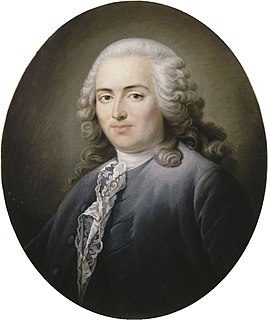A Quote by Thomas Paine
The earth, in its natural, uncultivated state was, and ever would have continued to be, the common property of the human race." As the land gets cultivated, "it is the value of the improvement, only, and not the earth itself, that is in individual property. Every proprietor, therefore, of cultivated lands, owes to the community a ground-rent..to every person, rich or poor...because it is in lieu of the natural inheritance, which, as a right, belongs to every man, over and above the property he may have created, or inherited from those who did
Quote Topics
Related Quotes
For everybody has a natural right not only to defend his own person and property against aggressors, but also to go to the assistance and defence of everybody else, whose person or property is invaded. The natural right of each individual to defend his own person and property against an aggressor, and to go to the assistance and defence of every one else whose person or property is invaded, is a right without which men could not exist on earth.
Legislators cannot invent too many devices for subdividing property... Another means of silently lessening the inequality of property is to exempt all from taxation below a certain point, and to tax the higher portions of property in geometrical progression as they rise. Whenever there is in any country, uncultivated lands and unemployed poor, it is clear that the laws of property have been so far extended as to violate natural right.
It is a moot question whether the origin of any kind of property is derived from nature at all. It is agreed by those who have seriously considered the subject that no individual has, of natural right, a separate property in an acre of land, for instance. By a universal law, indeed, whatever, whether fixed or movable, belongs to all men equally and in common is the property for the moment of him who occupies it; but when he relinquishes the occupation, the property goes with it. Stable ownership is the gift of social law, and is given late in the progress of society.
It is evident that the right of acquiring and possessing property, and having it protected, is one of the natural, inherent, and unalienable rights of man. Men have a sense of property: Property is necessary to their subsistence, and correspondent to their natural wants and desires; its security was one of the objects, that induced them to unite in society. No man would become a member of a community, in which he could not enjoy the fruits of his honest labour and industry.
One ideological claim is that private property is theft, that the natural product of the existence of property is evil, and that private ownership therefore should not exist... What those who feel this way don't realize is that property is a notion that has to do with control - that property is a system for the disposal of power. The absence of property almost always means the concentration of power in the state.
The earth has been cultivated before it has been divided; the cultivation itself having been the only motive for a division, and for that law which secures to every one his property. For the first persons who have employed themselves in cultivation, have probably worked as much land as their strength would permit, and, consequently, more than was necessary for their own nourishment.
My position as regards the monied interests can be put in a few words. In every civilized society property rights must be carefully safeguarded; ordinarily and in the great majority of cases, human rights and property rights are fundamentally and in the long run, identical; but when it clearly appears that there is a real conflict between them, human rights must have the upper hand; for property belongs to man and not man to property.
I would not have every man nor every part of a man cultivated, any more than I would have every acre of earth cultivated: part will be tillage, but the greater part will be meadow and forest, not only serving an immediate use, but preparing a mould against a distant future, by the annual decay of the vegetation which it supports.
If every person has the right to defend - even by force - his person, his liberty, and his property, then it follows that a group of men have the right to organize and support a common force to protect these rights constantly. Thus, since an individual cannot lawfully use force against the person, liberty, or property of another individual, then the common force - for the same reason - cannot lawfully be used to destroy the person, liberty, or property of individuals or groups.
Cultivation is at least one of the greatest natural improvements ever made by human invention. It has given to created earth a tenfold value. But the landed monopoly that began with it has produced the greatest evil. It has dispossessed more than half the inhabitants of every nation of their natural inheritance, without providing for them, as ought to have been done, an indemnification for that loss, and has thereby created a species of poverty and wretchedness that did not exist before.
We hold that the ownership of private property is the right and privilege of every American citizen and is one of the foundation stones upon which this nation and its free enterprise system has been built and has prospered. We feel that private property rights and human rights are inseparable and indivisible. Only in those nations that guarantee the right of ownership of private property as basic and sacred under their law is there any recognition of human rights.































